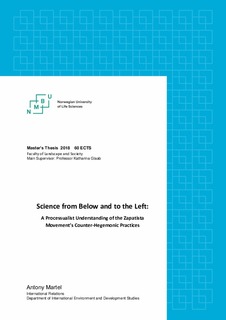| dc.description.abstract | Norms in International Relations are often discussed from the perspective of the Global North, while focusing on the political relations of transnational organizations and nation-states at high levels of politics, but there is much to be learned about norms that originate from the political processes occurring at the grassroots in the Global South. This study was conducted to address knowledge production at the grassroots beyond Europe and North America. The Zapatista Movement of National Liberation (EZLN), located in Chiapas, Mexico, is a social movement that is actively working to produce an alternative political project from within the Global South, which is an interesting location to ground a study of norms for International Relations. As a case study, this thesis analyzes the encuentro ConCiencias por la Humanidad, a science for humanity, hosted by the Zapatistas in Chiapas during December 2016 and December 2017. ConCiencias is a challenge to what the Zapatistas perceive as a dominant framework of capitalism laden within scientific research. This study analyzed this encuentro to see how knowledge production takes place in practice, with the use of semi-structured interviews of participants and observers at ConCiencias, while also trying to understand what the Zapatistas were challenging at ConCiencias. In doing so this study examined the historical relationship between science and capitalism in Mexican agriculture through a longue durée lens. Through this inquiry it was found that capitalist science in Mexico evolved historically as an idea through patterns of relations between the Mexican state and American interests that were longer and shorter in scale, which explains that norms align with power for reasons that are deeper and more complex than are currently addressed in the norm literature in International Relations. While analyzing ConCiencias, this study found that grassroots movements in the Global South offer constructive alternatives to address domination at the level of ideas by escaping the limitations of Eurocentric thought. ConCiencias, as a process initiated by the Zapatistas, formed an alternative conversation around a participatory science for the purpose of serving ordinary people, rather than capital. Moving forward, there is a possibility for critical norm research to study the construction of alternatives to dominant normative frameworks from the location of social movements in the Global South. | nb_NO |

